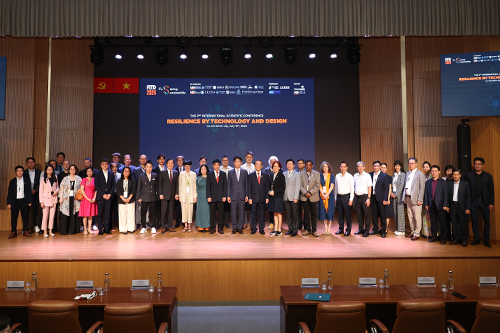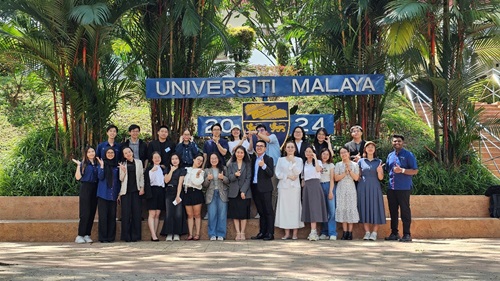JST June Seminar: "Does Bitcoin help diversify investment portfolio better than gold? Copula analysis and other aspects” Topic
Bitcoin is currently a hot topic in discussing the economic-financial transaction market. To clarify this topic, on June 29, 2022, JABES successfully organized the JABES Seminar Talks (JST) in June. The seminar was honored to receive the participation of Prof. Wing-Keung Wong with the presentation topic “Is Bitcoin better for portfolio diversification than gold? Copula analysis and other aspects” and attracted the attention of researchers, lecturers and students from other countries including: Korea, Sri Lanka, Indonesia, Belgium, Cambodia, Malaysia, Nigeria, India, Australia and so on.
Professor Wing-Keung Wong earned his Ph.D. from the University of Wisconsin-Madison, the USA, majoring in Business Statistics. Currently, he is a Professor at the School of Finance, Asia University; Professor at the School of Economics, Hong Kong Baptist University; Deputy Director of Risk Management Institute, National University of Singapore; is Editor, Advisory Board member, and Co-Deputy Editor-in-Chief for several international journals. Professor Wing-Keung Wong appears in the book “Who’s Who in the World” and is on the list of Top Economists in Taiwan, Asia, and RePEc. He has published more than 400 articles and earned more than 11,600 citations in Google Scholar, 9,900 citations in Researchgate, and 4,500 citations in Scopus.
GS. Wing-Keung Wong stated that Bitcoin, created by an anonymous account named Satoshi Nakamoto since 2008, quickly became a popular digital currency and is being traded worldwide through the electronic system. After that, although Bitcoin was officially banned from trading in China, specifically in accordance with the South China Morning Post (February 5, 2018), China has restricted websites related to digital currency trading and initial coin offerings (ICOs), including foreign backgrounds. However, one study published by Prof. Wu Xiaobo (Zhejiang University, China) titled “2018 White Paper on the New Middle Class” report revealed that Bitcoin and cryptocurrencies are part of the new middle-class investment portfolio in China.
In his presentation, Prof. Wong emphasized that gold – as a real asset, a “old” asset that has dated back millions of years - is used for investment in this asset. Bitcoin digital currency is derived from mathematical cryptography, is seen as an alternative to Government-backed currencies. Gold and Bitcoin share the same features as mining, decentralization, non-backed by Government, and traded globally anytime, anywhere. However, in reality, gold is less attractive to investors than Bitcoin (one of the most influential digital currencies in the country’s economy), which is restricted from trading. Therefore, Prof. Wong asked why Chinese investors are investing in Bitcoin, in digital currencies, even when the Chinese Government bans related transactions.
The research by Prof. Wong reviews on the Shanghai Gold Exchange because both gold and Bitcoin are similar in terms of trading. At the same time, the study builds a risk model based on the distribution of returns through different Copula functions. Mr. Wong’s research results indicate that Bitcoin’s price has a relatively high price elasticity, implying that Bitcoin’s value is volatile, whereas the stock prices of equities and gold are relatively more stable. When applying Copula to the investment portfolio, the portfolio with the appearance of gold will reduce risks for investors despite the fact that the rate of return is not high. On the contrary, the fact that Bitcoin offers a high rate of return reflects the high risk - this is the reason why gold is officially licensed for trading, whereas Bitcoin is usually only for adventurous, risk-averse investors.
After the main topic presentation of the Seminar, Prof. Wong answered questions regarding the research topic besides discussing those contents related to the diversification of investment portfolio, the factors affecting Bitcoin price, listed as: impact of COVID-19 pandemic, oil price, Russia-Ukraine conflict, and so on.
Additional pictures at the seminar:

Prof. Nguyen Trong Hoai delivering a welcome speech to Prof. Wing-Keung
Wong, guests and researchers, lecturers and students attending this JST June Seminar
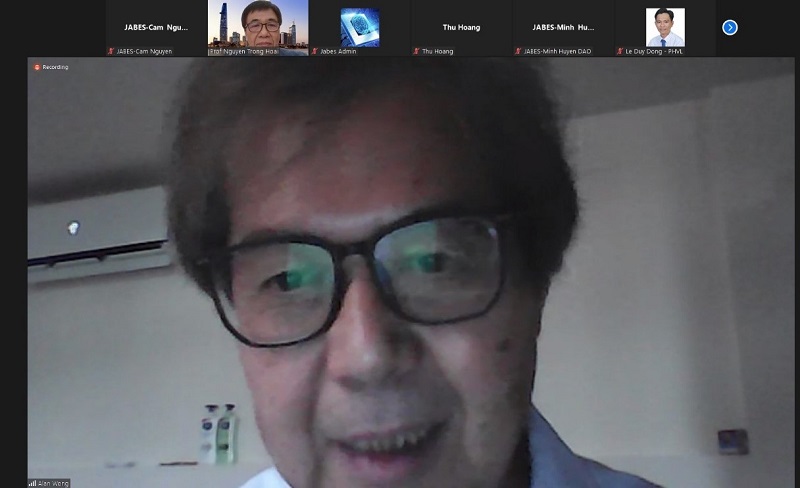
Prof. Wing-Keung Wong saying hello and presenting the research topic

Prof. Wing-Keung Wong comparing Bitcoin and Gold in the Chinese Market
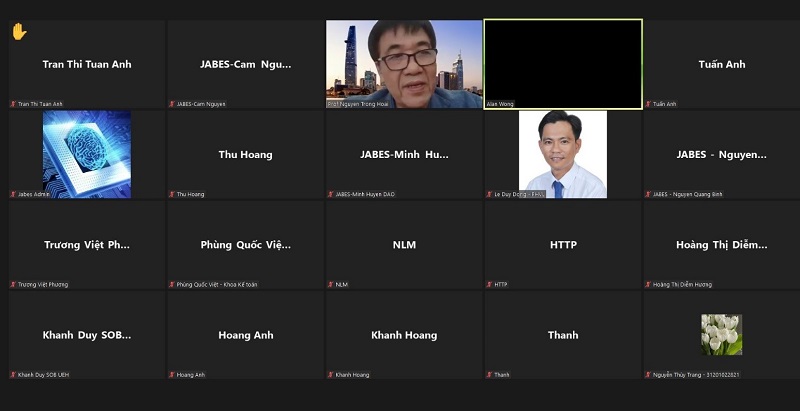
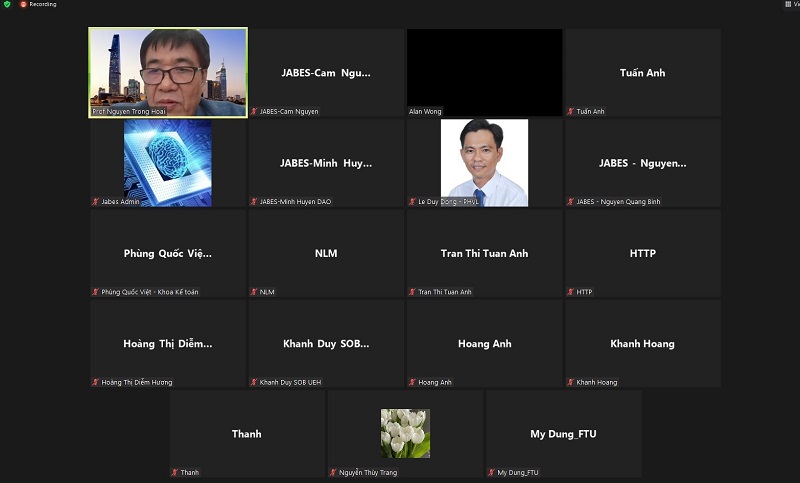
The participating researchers, lecturers and students asking further questions, exchanging and discussing personal ideas with Prof. Wing-Keung Wong
JABES Seminar Talks (JST) in June is part of the JST series of seminars in 2022 on “Economics and Business: Agendas for the Uncertain World” Theme. We do hope that this series of JST Talks will bring massive valuable ideas for all future researches and look forward to your participation in JABES’s JST 2022 series of seminars. For tracking, registration, and other details, please see more information as follows.
Additional information:
All new information concerning JABES and outstanding events listed as: ACBES International Scientific Conference 2022, JST Talk series will be continuously updated on JABES official information channels as follows:
JABES Facebook: https://www.facebook.com/jabes.ueh.edu.vn
JABES Website: http://www.jabes.ueh.edu.vn/
JABES on Emerald Group Publishing: https://www.emeraldgrouppublishing.com/journal/jabes
ACBES Website: https://acbes.ueh.edu.vn/
JABES Youtube: http://shorturl.at/jnoOR
News, photos: JABES

![[Podcast] Sustainable University Model For Emerging Markets](https://en.ueh.edu.vn/images/upload/thumbnail/ueh-thumbnail-093312-071924.png)
![[Podcast] Does the Financial Flexibility Prevent Stock Price Crash Risk during COVID-19 Crisis? Evidence from the Vietnamese Stock Market](https://en.ueh.edu.vn/images/upload/thumbnail/ueh-thumbnail-114718-071624.png)
![[Podcast] An Evaluation Of Two Business English Course Books, Business Partner B1+ Business Partner B2: Students’ And Teachers’ Perspectives](https://en.ueh.edu.vn/images/upload/thumbnail/ueh-thumbnail-113649-071624.png)
